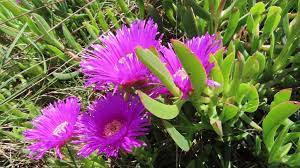
Invasion of the habitat snatchers
What’s happening? An “environmental emergency” has been taking place in the Channel Islands due to the presence of the invasive sour fig plant, according to the Alderney Wildlife Trust. Volunteers removed between three and four tonnes of the plant from dunes at Saye on 13 November. Sour fig – a non-native plant from South Africa that had been brought to the island in the 1950s – prevents other species, including wildflowers, from growing. (BBC)
Why does this matter? We’ve previously talked about the adverse impacts of using non-native species for carbon-offsetting tree planting projects. But the problem is not just limited to trees – and it could soon get much worse thanks to climate change.
Ecosystem destruction – Invasive species are defined as species found in habitats outside of their natural range. Enabled by a lack of predators and a high level of adaptability, they can produce rapidly, causing substantial damage to the environment.
While some invasive species, such as the grass carp, harm ecosystems by destroying natural vegetation, others pose a direct threat to native species. For instance, the Asian giant hornet (which goes by the charming name of “murder hornet”) is an apex predator that can decimate a whole hive of Western honeybees within hours.
Economic and health impacts – The uncontrolled spread of invasive species also has significant economic consequences. Zebra mussels, for example, love to settle in large numbers on aquatic infrastructures such as pumps, pipelines or hydropower equipment, leading to annual damages of £5m in the UK. Across Africa, invasive plants and animals, like the fall armyworm, cause crop yield declines, increased labour costs and livestock reductions amounting to agricultural losses of $65.58bn per year. Between 1970 and 2017, invasion damages and control efforts cost the global economy at least $1.288tn, with annual losses roughly doubling every six years.
Moreover, some species also pose a direct threat to human health by transmitting viral pathogens. The Asian tiger mosquito, one of the most invasive insects in the world, spreads a host of diseases, including the West Nile and dengue fever, and is becoming a growing health concern in Europe.
On the move – Experts agree that invasive species could become more widespread in the future due to climate change. Rising temperature and precipitation changes are altering ecosystems around the world at unprecedented speed, leaving many species unable to adapt and forcing them to move to new habitats. Scientists found terrestrial species are already shifting their distribution to higher altitudes and towards the poles by 11 metres and 16.9 km per decade, respectively – that’s 4.6 metres per day.
The speed and scale of this mass migration have already led some researchers to believe the dichotomy between native and non-native species might soon become obsolete, and that new approaches to wildlife management and conservation are needed.
Unexpected benefits – Although most invasive species have detrimental effects on the health of humans and ecosystems, some have surprising advantages. In Hawaii, for example, some non-native birds introduced by humans are now carrying out the essential ecosystem functions of seed dispersal and pollination previously covered by species that have gone extinct. And in the Caribbean, the Sargasse Project is turning exploding populations of harmful seaweed into marketable paper pulp, potentially setting an example for other regions.


